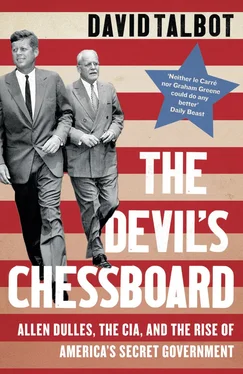Chatting with the Bonn station chief, Wolff soon got to the point. He wanted assurances that he would have no trouble securing a visa for his visit to the United States. Informed about his old wartime collaborator’s wishes, Dulles pulled strings on his behalf in Washington. But the two men were never to be reunited in America. Karl Wolff’s name still stirred too much unease in the bowels of Washington’s bureaucracy. Some foreign service functionaries began asking awkward questions about the general’s wartime activities. There were some specters from the past, realized Dulles, that were best left in the past, to be conjured only in one’s smoothly crafted memoirs.
Karl Wolff was not the only prominent SS officer who greatly benefited from Dulles’s Operation Sunrise. In the fall of 1945, former SS colonel Eugen Dollmann, Wolff’s principal intermediary during the Sunrise negotiations, found himself living in a gilded cage in Rome. The apartment, which was located on Via Archimede, a quiet, horseshoe-shaped street in the city’s exclusive Parioli district, contained few distractions for the bored Dollmann. But he did discover an extensive sadomasochistic literary collection left behind by the former tenant, a German mistress of Mussolini, and he whiled away the hours reading about feverishly inventive ways to mortify the flesh. Dollmann was not an entirely free man, since he was a guest of U.S. intelligence officers. But, even though he remained under close surveillance, compared to his accommodations after he and Karl Wolff were arrested in May, the colonel’s Parioli lifestyle was sublime.
Before he was spirited off to Rome by the Strategic Services Unit, the agency that replaced the disbanded OSS after the war, the Nazi diplomat had been installed in a temporary cell at Cinecittà Studios. Spoiled by years of the best Italian cuisine, Dollmann found the rations at Cinecittà so distasteful that he considered joining a hunger strike started by fellow POW Gudrun Himmler, the late Reichsführer’s daughter. Then he was transferred to a POW camp in Ascona, on picturesque Lake Maggiore, where the daily fare—consisting mainly of watery pea soup—was even more objectionable, and the inmates were forced to sleep in tents that floated away in heavy downpours. Dollmann later had the nerve to compare Ascona to Dachau. “ At least in Dachau they had wooden huts,” he observed.
Relief for Dollmann came when he was transferred to a low-security prison camp run by the British military in Rimini, on the Adriatic coast. One night, Dollmann found it remarkably easy—one American intelligence agent would call it “suspiciously” easy—to cut through the wires encircling Rimini and flee to Milan, where he knew he would find sanctuary. Here Dollmann presented himself to the well-connected cardinal Alfredo Ildefonso Schuster in the prelate’s palazzo adjoining the enormous Gothic cathedral. Dollmann, known as one of Rome’s more elegant peacocks during his SS glory days, now sat before the eminent cardinal in a filthy raincoat, looking the worse for wear after his frantic trek from Rimini.
As they sipped liqueur from long-stemmed glasses, Dollmann reflected on how the cardinal always put him in mind of “ a delicate alabaster statue.” But Schuster, who had worked with Wolff’s SS team on the Sunrise deal, was not as refined as all that. The wily cardinal was part of the Vatican elite that had collaborated with Mussolini’s fascist regime—and, out of self-interest, he was inclined to help Dollmann now, to avoid an embarrassing war crimes trial. Besides, Schuster thought that men like Dollmann might still play a useful role in postwar Italy; he hoped to recruit the former SS officer in the campaign against the Church’s nemesis, the Italian Communists, who had emerged from the war as a powerful political force.
Dollmann, who was conniving by nature but not political, was uninterested in the cardinal’s plot, but he was in no position to quibble. He allowed himself to be safely hidden away in a Church-run asylum for wealthy drug addicts, where his fellow inmates included a fading Italian film diva and an emotionally fragile duchess. As he languished among the delicato junkies, Dollmann decided to sample some of the forbidden fruit that the screen siren kept stashed in her room, snorting a snowy mound of heroin. For a time, Dollmann—who had much to forget in his life, but was plagued by a detailed memory—seemed in danger of disappearing among the lotus eaters.
Salvation came in the form of James Jesus Angleton, a rising young star in U.S. intelligence who had run the X-2 branch (OSS counterintelligence) in Italy during the war and had stayed behind to use his wiles against the Communists. After tracking down Dollmann in the Milan asylum, Angleton sent a big U.S. Army Buick with a chauffeur to pick him up and drive him to the Eternal City, where he installed Dollmann in the Via Archimede safe house in the Parioli district.
Counterintelligence was the spy craft’s deepest mind game—it was not just figuring out the enemy’s next moves in advance and blocking them, but learning to think like him. Not yet thirty, Angleton was already being talked about in American and British intelligence circles as one of the masters of the field. He had been educated in British prep schools and at Yale, where he had edited the avant-garde poetry magazine Furioso and courted the likes of Ezra Pound and e.e. cummings as contributors, and he seemed to bring an artist’s intuition to his profession. But he could get lost in the convolutions of his own fevered mind, which drove him to prowl the streets of Rome late at night in a black overcoat so big it looked like a cape, on the hunt for clues about the growing Communist menace, and to crawl around on his office floor at 69 Via Sicilia in search of hidden bugging devices.
Angleton was as gaunt as a saint. (His wife, Cicely, would rhapsodize about his “ El Greco face.” His colleagues called Angleton “the Cadaver.”) He smoked incessantly, and his bony frame was wracked by consumptive fits of coughing. When he introduced himself to Dollmann, Angleton must have struck the colonel as yet another strung-out soul. But Angleton’s addiction was of a more ideological nature.
As Angleton sat with Dollmann in the comfortable, five-room apartment on Via Archimede, the young spy explained his vision for the new world. Dollmann felt bound to listen politely, since Angleton had gone to the trouble of plucking him from Cardinal Schuster’s madhouse. But Dollmann had heard it all before—with even more fervor—from the Führer himself and his SS overlords: how Bolshevism must be crushed for the new world to be born, why there must be no rules in a clash like this between civilization and barbarity.
Angleton, however, was lost in his own passion. He had found strong support for his views from Allen Dulles in the months after the war, as Dulles lingered in Europe, hoping that President Truman would anoint him commander of the shadow war against the Soviet Union. In October 1945, Dulles visited Rome with Clover, ostensibly to revive their marriage after the strains of separation during the war. But he had another mission as well: to organize the Italian front in the new Cold War. Angleton, who was wired into the Vatican, helped arrange a secret meeting for Dulles with Pope Pius XII, who had maintained a mutually beneficial arrangement with Mussolini’s regime and was a determined foe of Communism.
Angleton looked up to Dulles as a mentor—a powerful figure in the mold of his adored father, James Hugh Angleton, an international businessman who had paved his son’s path into the spy trade and continued to play an influential role in the young spook’s life. Dulles would remain a strong, paternal figure for Angleton junior throughout their deeply entwined intelligence careers. In Rome, the two men conferredabout the growing “Red challenge” and “the drastic, sub-rosa measures required to meet it,” as a colleague put it. These extreme measures included recruiting agents “without overscrupulous concern for [their] past fascist affiliations.”
Читать дальше











